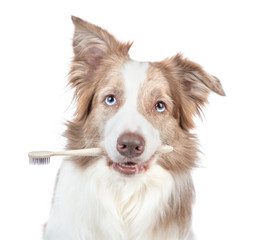It’s Pet Dental Health month, so to celebrate we’ve put together our top tips for looking after your pet’s gnashers.
1. Teeth brushing
You may or may not know that ideally your dog or cats’ teeth should be cleaned daily, and at the very least you should be cleaning your 4 pawed friends pearly whites twice a week to avoid the build-up of plaque and future dental disease.
Use a pet toothbrush and pet toothpaste to gently remove any build-up from their gums and teeth. Finger brushes are ideal for pets and you can get these from your veterinary surgery.
Your pet may not enjoy this at first, but most will get used to it over time the more you do it, and if you start brushing their teeth from a young age, they will get used to it in no time!
If you aren’t confident brushing your pet’s teeth, talk to your veterinary practice and they will be able to offer advice.
Never use human toothpaste for your pet. The fluoride levels in human toothpaste can make them very poorly if it is eaten.

2. Dental Chews
Dental chews are designed to remove plaque and tartar as they are chewed and are an alternative if teeth brushing isn’t possible. Any pet can develop dental issues such as gum disease or tooth decay so it is important that you have a cleaning regime in place to minimise the risk of future dental problems.
Be mindful of how many dental treats you give your pet in a day as generally they can be high in calories and could lead to weight issues.

3. A Healthy Diet
Just like us, if your pet has a bad diet, their teeth and gums may suffer. Many commercially produced pet foods are high in sugars and carbohydrates which can contribute to the problem.
Making sure your pet is eating a well-balanced diet is essential to their overall health but if you are especially concerned about their teeth, special dental diets are available.
Please discuss any diet changes with your vet.

4. Regular check ups
Your vet should check your pets’ teeth when they go for their annual check-up. They will be able to make sure your pet’s teeth are healthy, your pet is comfortable, and answer any questions you might have about your pet’s dental health.
If dental hygiene is becoming an issue, they will recommend that your pet has a scale and polish to remove the build-up of plaque. If this is left untreated it leads to tartar, gingivitis and finally tooth decay which can be painful for your pet and costly to treat.

5. Be observant:
If your pets’ teeth aren’t kept clean, they could become covered in plaque. Here are some signs to look out for that indicate that your pet’s dental health needs to be addressed:
- Yellow/brown teeth
- Bad breath
- Trouble eating
- Bleeding gums
- Reduced appetite
- Weight loss
- Loss of interest in grooming themselves
If you think your pet is suffering with plaque, it is important to get it seen to by a vet before it develops into something more serious such as gum problems and tooth loss!


